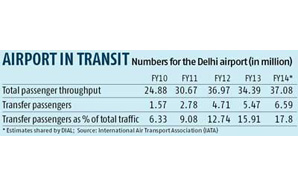Delhi airport emerging hub for global flyers
By Sharmistha Mukherjee & Surajeet Das Gupta, Business Standard, New Delhi - January 17, 2014
Air India provides for over 41% of transit passengers at DIAL followed by Jet and IndiGo
 The Delhi airport, with the share of its transit passengers in total annual traffic nearly doubling
in three years to about 18 per cent, appears to be transforming itself into an
international hub.
The Delhi airport, with the share of its transit passengers in total annual traffic nearly doubling
in three years to about 18 per cent, appears to be transforming itself into an
international hub.
Delhi International Airport Ltd (DIAL) has estimated the number of transit passengers for
the airport to hit 6.59 million by the end of March, 17.77 per cent of its
projected 37.08 million annual traffic.
Buoyed by Air India's Star Alliance induction, expected to add scale to the
airline's global flight plans, DIAL expects transit passengers' share in total
to increase to 25-26 per cent by 2015-16. That would put Delhi in the league of
global airport hubs like Chicago and Hong Kong (where transit passengers
account for 26 per cent of total) and Bangkok (around 40 per cent). Airports
like Singapore and Dubai, which hardly have any domestic business, have more
than 50 per cent of their business coming from transit passengers.
DIAL, the GMR Infra-led consortium that operates the Delhi airport,
also expects full-service carriers like Tata-Singapore Airlines to start
long-haul flights using Delhi as a hub, especially with the government planning
to remove the restrictions — such as five years of operational experience and a
fleet of at least 20 aircraft — on domestic carriers flying abroad.
"The number of transit passengers at Delhi's T3 (Terminal 3) has gone up
substantially in the past three years. With Air India moving into Star
Alliance, we expect a lot of partner airlines to make India the hub. We expect
transit traffic to account for 25-26 per cent of passengers by 2015-16,†said
Kiran Jain, head of airline marketing and route development at DIAL.
According to data available with
International Air Transport Association (IATA), transit passengers constituted
16 per cent of the Delhi airport's total passenger traffic last financial year,
compared with 12.74 per cent in 2011-12. In 2012-13, DIAL saw 5.47 million
transit passengers using the airport — the growth in transit passengers came
even as total passenger throughput declined around seven per cent to 34.39
million.
"The share of transit passengers in the total traffic is around 19.6 per cent.
Most of these passengers come from neighbouring countries like Nepal,
Bangladesh and Sri Lanka. But, with Air India starting direct flights to
Birmingham, Sydney and Melbourne, we see passengers from Europe transiting in
Delhi before travelling to Australia. At least 12 per cent of the passengers on
Air India-Birmingham flights will transit at Delhi to go to Australia every
day. Also, many will come from Birmingham and transit to domestic destinations
and neighbouring countries. The total transit passengers on this route is 75
per cent,†said Pradeep Panicker, chief commercial officer (aero), DIAL.
In 2013-14, DIAL expects a transit traffic of 6,598,268 - an increase of 20.6
per cent from the previous year.
Air India accounts for a little over 41 per cent of transit passengers at the
Delhi airport. The state-run carrier, which feeds traffic at the airport from
Indian cities and regional international destinations going to Europe, US and
Australia, is followed by Jet Airways and IndiGo. Also, China Airlines flies from Taipei to Rome,
transiting from Delhi and Ethiopian Airlines flies from Adis Ababa to Beijing
via Delhi.
Industry experts expect the proportion of transit passenger in the total to go
up substantially after Tata-SIA starts operations. "SIA could use New
Delhi to launch new flights to North and South America, alongside its Indian
subsidiary, while picking up domestic feed traffic, thereby remedying SIA's
network deficiencies," said Hong Kong-based aviation analyst Daniel Tsang.
According to Centre for Asia Pacific Aviation (Capa), about 40 per cent of international traffic out of
India travels to its final destination through an intermediate offshore
airport. As much as half of such traffic is captured by hubs in West Asia. With
Tata-SIA starting domestic operations, the Delhi airport is likely to get a
boost in realising its potential.
"Delhi airport's position as a global hub will get a boost with both Air
India and Tata-SIA using it as a hub for long-haul flights," said Amber
Dubey, partner & head (aerospace and defence), KPMG.

Stay on top of OOH media trends

_(2)_140_270.jpg)
_(1)_140_270.jpg)
_140_270.jpg)




